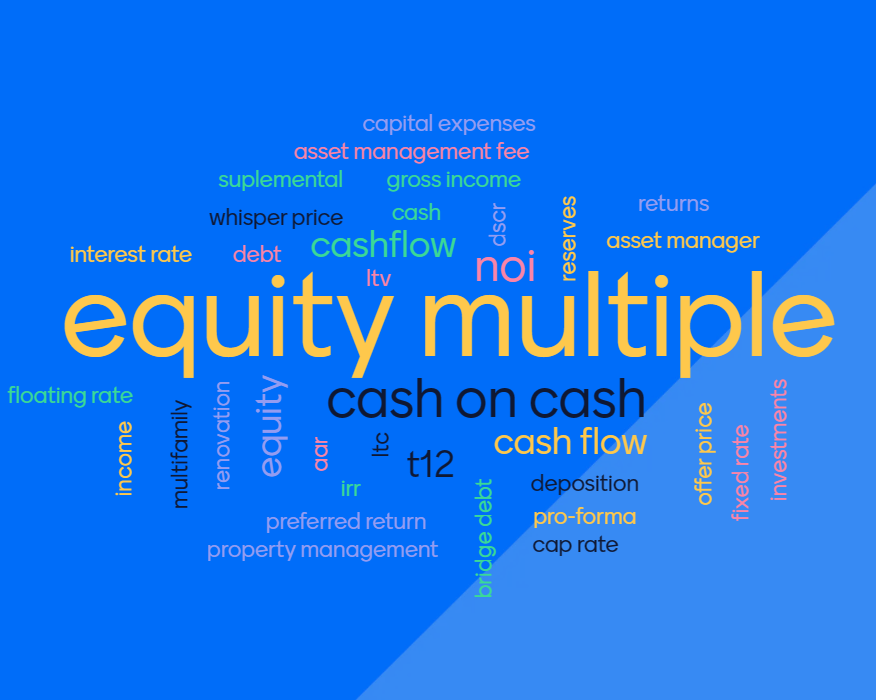What is Exit Cap Rate? 🎯
The exit cap rate, or terminal cap rate, is the rate at which a property...
In multifamily syndications, earnest money is a deposit made by a buyer to signal genuine intent to purchase a property. It’s essentially a "good faith" gesture that shows sellers the buyer is serious about the transaction. This deposit, typically a percentage of the purchase price, is credited toward the purchase but can be forfeited under certain conditions, making it a potential risk.
Earnest money is crucial because it can significantly strengthen a syndicator’s position in a competitive market where multiple buyers may be vying for the same property. By offering a sizable earnest deposit, syndicators can effectively demonstrate their dedication and seriousness about the transaction, making them more appealing and trustworthy to sellers who are looking for reliable buyers.
This earnest deposit acts as a tangible commitment, signaling to the seller that the syndicator is not only interested but also financially prepared to move forward with the purchase. However, this commitment also places considerable pressure on syndicators to complete the due diligence process both quickly and thoroughly. The due diligence phase is critical, as it involves a comprehensive evaluation of the property, including financial assessments, inspections, and legal reviews, to ensure that the investment aligns with the syndicator's business objectives. Failure to meet the contract terms or uncover potential issues during this period can result in the loss of the earnest deposit, which can be a significant financial setback.
In multifamily deals, earnest money deposits can range from 1-3% of the purchase price. In some competitive markets, syndicators may even increase this amount to stand out among other buyers. Non-refundable earnest money—where the deposit is “hard” and not refundable after certain contingencies—can be a tactic to secure a deal but adds risk if issues arise during due diligence.
Earnest money becomes non-refundable after the due diligence period ends, provided the buyer doesn’t terminate the contract based on due diligence findings. This period allows syndicators to review financials, conduct inspections, and ensure the deal aligns with their business plan.
If issues arise that could impact profitability, the syndicator may withdraw without losing the earnest deposit.
For investors, earnest money serves as a tangible representation of a sponsor’s commitment to a deal, but it also introduces a level of risk if not managed with precision and care. The earnest money deposit is a critical component of the transaction, as it signals to the seller that the buyer is serious about purchasing the property. However, if a syndicator places earnest money too early in the process or opts to make it non-refundable without completing thorough due diligence, it can expose the deal to unnecessary risks. This is because the due diligence phase is essential for uncovering any potential issues with the property that could affect its profitability or alignment with the syndicator's business objectives. If these issues are not identified before the earnest money becomes non-refundable, the syndicator could face significant financial setbacks, which in turn could impact the limited partners (LPs) involved in the investment.
It is important to note that most of the time, limited partners (LPs) enter the deal after or during the due diligence phase. This timing is crucial because it means that the earnest money, which is at risk during the initial stages of the transaction, is typically provided by the general partner (GP) team rather than the LPs. As a result, the LPs' capital is not used as earnest money, thereby shielding it from the immediate risks associated with the earnest deposit. This arrangement allows LPs to participate in the investment without the direct risk of losing their capital if the deal falls through during the due diligence period. In this context, earnest money deposits, when managed correctly, not only demonstrate confidence in the property but also increase the likelihood of a successful transaction, providing reassurance to LPs that their investment is being handled with care and strategic foresight.
A well-managed earnest money process shows a sponsor’s experience and discipline. Sponsors who confidently and carefully manage these deposits are more likely to make smart, risk-aware investments, which reassures passive investors. Additionally, sponsors with established broker relationships often secure favorable terms on earnest money, indicating their market reputation.
Earnest money is more than just a deposit; it reflects a syndicator's commitment and financial stake in the transaction. While it enhances the sponsor's offer and builds credibility with sellers, it's important for limited partners to understand the timing and conditions of earnest money, as it directly impacts the risk and return potential of a multifamily syndication.
Let's Continue the Conversation: We invite you to engage with us in several ways:
Explore Opportunities: Discover how our syndications can improve your retirement plan. Contact us to explore investment opportunities and gain insights into the path to passive income. CLICK HERE to schedule a call.
Subscribe to Our Blog: Stay informed about the role of real estate in retirement planning. Subscribe to our blog and receive regular updates, expert advice, and success stories.
Connect on Social Media: Join our community on social media to interact with like-minded individuals who are also on the journey to a prosperous retirement.
CLICK HERE to schedule a call.
Download our free e-book at the link https://content.bluepathholdings.com/free-ebook.

The exit cap rate, or terminal cap rate, is the rate at which a property...

We're thrilled to kick off a brand-new series aimed at deep-diving into crucial terms within the...

In this week’s installment of our "Decoding Real Estate Jargon" series, we dive into the crucial...